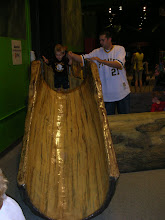21st century skills and life long learning seem as though they would be simultaneous. I would simply say this because of the technological advances we as a society are making. The question that many would like to know as well as myself is: Are these students thinking differently? Or is it the way we are teaching students that is making for the educational advancements? According to Vintare and Majinovska (2009) there might be another reason: “Since information and communication technologies (ICT) have become an integrated component of work places, schools and homes, they have changed the life style, manner of work, recreation, communication and learning of every individual. Education institutions are influenced by the societal events constantly occurring around them (Vintare and Majinovska 2009). Recently, several developments in the workplace, changes in student demographics, and the economic trends have been forcing education institutions to change. The growth of knowledge in any field is rapidly outstripping any individual's ability to remain up-to- date. Knowing how to access information rather than memorizing information is central to coping with this rapid change (Vintare and Majinovska 2009). Access to the Internet has allowed learners to take courses virtually. Thus, educators should be aware of their role in social change and be able to justify to themselves the role in which we play. Education is facing a specific set of tasks: to alter the school programs, teaching standards, technical aids, and most important the methods in order to ensure that everything that is taking place at school is in compliance with the changes in information and communication technology that are going on in the society (Vintare and Majinovska 2009). Vintare and Majinovska (2009) seem to think that societal influence does not change the students mind but it is though they are adapting to their environment. Teachers need to understand that their roles have changed along with the students. Having the virtual classroom has made this evident. The students are not in a conventional classroom, and teachers are able to post their class instead of actually teach. I have attended both online and conventional educational settings and find that both have their positive and negatives. Studies of effective schools have established a number of cultural elements that have some impact on student achievements. M. Fullan (2001) singled out academic challenges, a sense of community, recognition for achievement and perception of school goal as positives. Y.C. Cheng (1993) related organizational ideology, shared participation, charismatic leadership and intimacy to stronger teacher motivation and satisfaction. P. Senge (1990), M. Fullan (2001) point to the importance of shared vision by a strong leader with a sense of moral purpose. All of these ideas are fundamental yet in an online classroom where is the sense of community; other then group projects? Are teachers really able to motivate a student that is three thousand miles away? I would like to think that teachers are all mighty and able to reach and motivate all, but I find it hard to believe this ca be true of an online class.
References:
Cheng, Y.C. (1993). Profiles of Organizational Culture and Effective Schools. School Effectiveness and School Improvement, vol. 4, no. 2, pp. 85-110.
Fullan, M. (2001). Leading in a Culture of Change. San Francisco, Jossey-Bass.
Senge, P. (1999). The Dance of Change: The Challenges to Sustaining Momentum in Learning Organizations. New York, Doubleday.
Vintere, Anne and Majinovska, Larisa (2009). Changing the Education Culture Through Technology. Problems of Education In The 21st Century, vol 13.

No comments:
Post a Comment